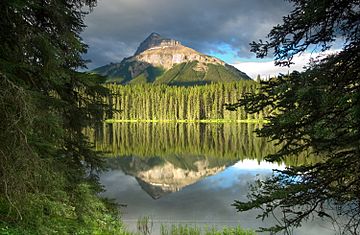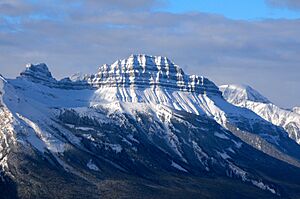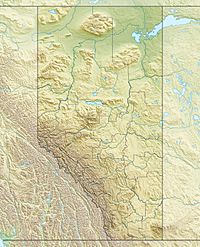Pilot Mountain (Alberta) facts for kids
Quick facts for kids Pilot Mountain |
|
|---|---|

Pilot Mountain from Pilot Pond
|
|
| Highest point | |
| Elevation | 2,935 m (9,629 ft) |
| Prominence | 302 m (991 ft) |
| Geography | |
| Country | Canada |
| Province | Alberta |
| National Park | Banff |
| Parent range | Massive Range |
| Topo map | NTS 82O/04 |
| Climbing | |
| First ascent | 1885 by the GSC |
| Easiest route | Difficult scramble |
Pilot Mountain is a cool mountain located in Banff National Park, Alberta, Canada. It sits in the beautiful Bow River valley. You can find it southeast of Redearth Creek and directly west of the Trans-Canada Highway.
A person named George M. Dawson gave the mountain its name in 1884. He called it 'Pilot Mountain' because it's in a spot where the Bow Valley turns. This means you can see the mountain from far away, acting like a guide or 'pilot' for travelers.
You can climb Pilot Mountain by a method called "scrambling" on its northwest side. Scrambling is like a mix of hiking and easy rock climbing. It's best for people who are good at finding their way. Another nearby mountain, Mount Brett, can also be climbed from a ridge connected to Pilot Mountain.
How Pilot Mountain Formed
Like other mountains in Banff Park, Pilot Mountain is made of sedimentary rock. This type of rock forms when layers of sand, mud, and tiny bits of sea creatures settle over millions of years. These layers were laid down from the Precambrian to Jurassic periods, which are very long times in Earth's history.
These rocks formed in shallow ancient seas. Later, during a huge event called the Laramide orogeny, these rock layers were pushed up and folded. This powerful force created the mountains we see today.

Weather at Pilot Mountain
Pilot Mountain has a subarctic climate. This means it has very cold, snowy winters. Summers are usually mild. Temperatures can drop below -20 °C (which is -4 °F). With the wind, it can feel even colder, sometimes below -30 °C (-22 °F).
 | Precious Adams |
 | Lauren Anderson |
 | Janet Collins |


